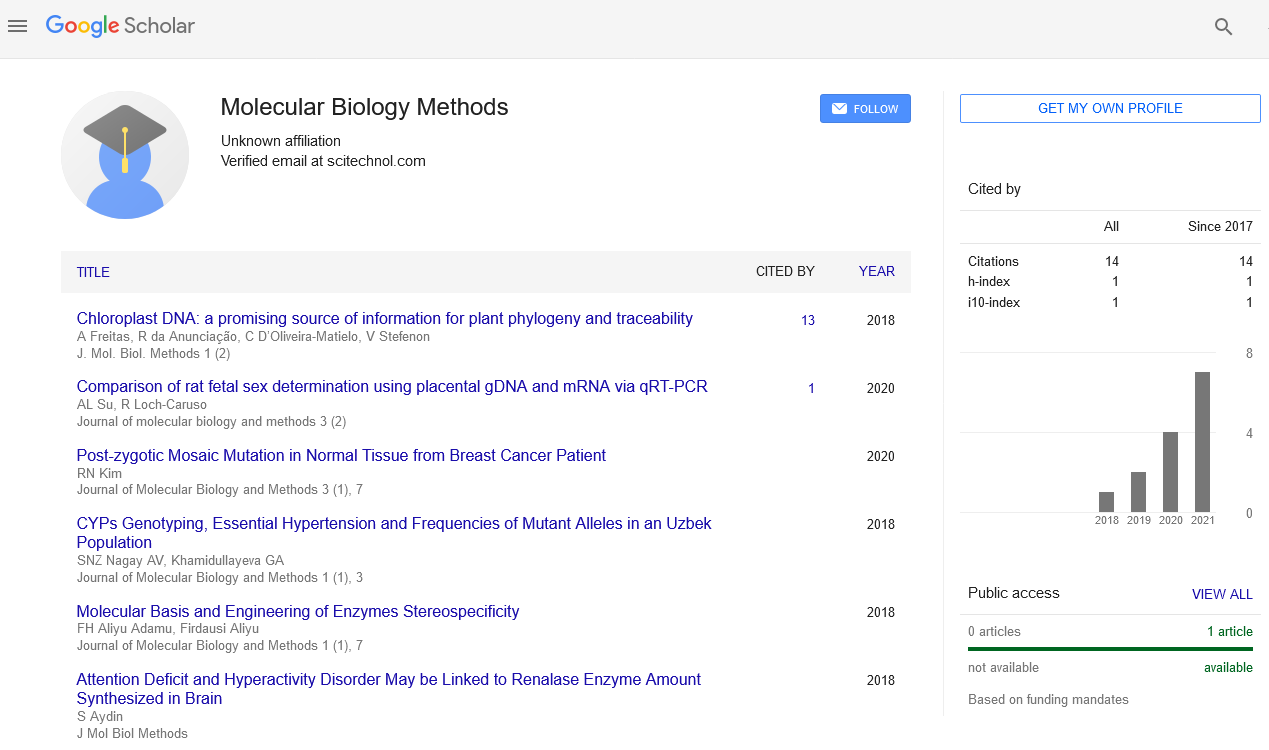Opinion Article, J Mol Biol Methods Vol: 6 Issue: 4
An Overview on Immunology: Unveiling the Body’s Defense System
Andrew Coetzer*
1Department of Zoology and Entomology, University of Pretoria, Pretoria, South Africa
*Corresponding Author: Andrew Coetzer,
Department of Zoology and Entomology,
University of Pretoria, Pretoria, South Africa
E-mail: coetzerandr_ew5582@edu.za
Received date: 27 November, 2023, Manuscript No. JMBM-24-124366;
Editor assigned date: 30 November, 2023, Pre QC No. JMBM-24-124366 (PQ);
Reviewed date: 14 December, 2023, QC No. JMBM-24-124366;
Revised date: 21 December, 2023, Manuscript No. JMBM-24-124366 (R);
Published date: 28 December, 2023 DOI: 10.5958/jmbm.1000154
Citation: Coetzer A (2023) An Overview on Immunology: Unveiling the Body’s Defense System . J Mol Biol Methods 6:4.
Description
Immunology, a field at the intersection of biology and medicine, delves into the fascinating mechanisms that safeguard our bodies from harmful pathogens while maintaining a delicate balance to avoid autoimmunity. It's a complex weaving material of cells, proteins, and organs working harmoniously to protect against infections and diseases, offering a captivating insight into the body’s defense mechanisms.
At its core, immunology revolves around the immune system the body’s defense mechanism comprised of a sophisticated network of cells, tissues, and organs. Its primary goal is to discern between self and non-self and protect the body from invaders like bacteria, viruses, fungi, and parasites. This defense system is composed of innate and adaptive immunity, each with distinct roles in defending against pathogens.
The first line of defense, innate immunity, is the body’s immediate reaction to pathogens. It acts as a rapid responder, employing physical barriers such as skin and mucous membranes, along with cellular components like phagocytes (neutrophils, macrophages) and natural killer cells, which engulf and destroy invading pathogens. Additionally, the complement system, a group of proteins, plays a an important role by marking pathogens for destruction or directly killing them.
Adaptive immunity is a highly specialized system that evolves over time to recognize and remember specific pathogens. This arm of the immune system consists of T and B lymphocytes, which possess receptors that can identify and bind to unique antigens presented by pathogens. Through this recognition, these cells initiate a tailored response, either by directly attacking infected cells (T cells) or producing antibodies (B cells) that neutralize or tag pathogens for destruction by other immune cells.
One of the most fascinating aspects of adaptive immunity is immunological memory. Upon encountering a pathogen, specialized cells retain a memory of the invader, enabling the immune system to mount a quicker and more effective response upon subsequent exposure. This forms the basis for vaccination the introduction of weakened or inactive pathogens to trigger an immune response and establish memory without causing illness.
Several organs and specialized cells play pivotal roles in arranging the immune response. The thymus and bone marrow are primary sites for immune cell development, particularly T and B cells. Lymphoid organs like the spleen, lymph nodes, and tonsils serve as hubs where immune cells interact, detect pathogens, and initiate immune responses. Dendritic cells, known as sentinels of the immune system, patrol tissues, capturing and presenting antigens to activate T cells, crucial for mounting an adaptive immune response.
Disruptions or dysregulation within the immune system can lead to various disorders. Autoimmune diseases, such as rheumatoid arthritis and lupus, occur when the immune system mistakenly targets the body's own tissues. Immunodeficiencies, like HIV/AIDS, weaken the body's ability to fight infections. Allergies and hypersensitivities result from exaggerated immune responses to harmless substances.
Therapeutic interventions in immunology have revolutionized medicine. Vaccines prevent numerous infectious diseases by priming the immune system against specific pathogens. Immunotherapies, including monoclonal antibodies and checkpoint inhibitors, harness the body's immune response to combat cancer. Advances in gene editing techniques, like CRISPR-Cas9, hold promise in treating genetic immune disorders.
As our understanding of immunology deepens, several challenges and opportunities emerge. Researchers are exploring personalized immunotherapies tailored to an individual's immune profile. The quest to develop universal vaccines against broad classes of pathogens continues. Moreover, the burgeoning field of immune-metabolism investigates the intricate link between metabolism and immune function, offering new avenues for therapeutic exploration.
Immunology stands as a cornerstone of modern medicine, unraveling the complexities of our body's defense system. From the innate responses that act as immediate barriers to the adaptive memory that guards against future threats, this field continually unveils new insights and therapies.
 Spanish
Spanish  Chinese
Chinese  Russian
Russian  German
German  French
French  Japanese
Japanese  Portuguese
Portuguese  Hindi
Hindi 